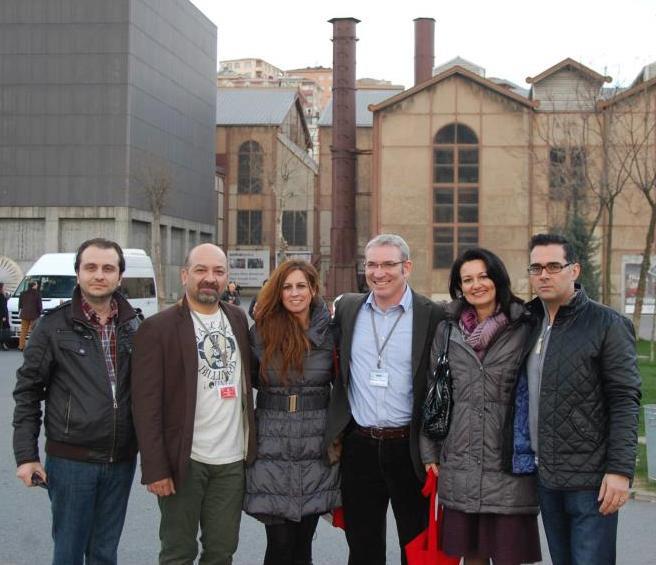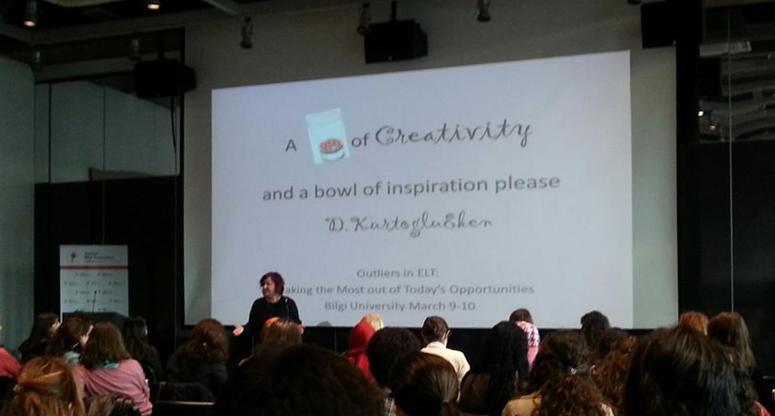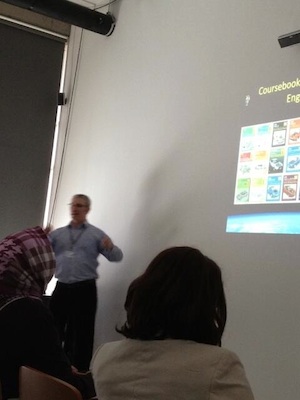The 1st International Conference on Outliers in ELT: Making the Most out of Today's Opportunities

The 1st International Conference on Outliers in ELT: Making the Most out of Today's Opportunities
Adam Simpson's write up of the conference
As the practitioners of ELT, we are struggling hard to find creative ways to meet the increasing demands of an ever-changing world. We are creating and adapting the most recent technology to promote communication. We are seeking every single possibility to increase our learners’ interaction. We are relentlessly updating our methodology and materials to address various skills. With this endless procession of change in language teaching and learning perspectives, some questions remain untouched domains. How far beyond the borders of classroom can English Language Teaching go? How differently can the profile of an English Teacher develop and what divergent practices may come out of these different ELT profiles? These were the questions around which The 1st International Conference on Outliers in ELT, which was held on March 9th-10th, 2013 at İstanbul Bilgi University’s santralistanbul Campus, revolved.
The School of Languages was well represented among the Seven plenary keynote speakers, more than 15 concurrent keynote speakers, with Dr. Deniz Kurtoğlu Eken, Deniz Ateşok and Adam Simpson all delivering talks.
Talks delivered by members of the School of Languages

Deniz Kurtoğlu Eken’s plenary talk ‘A shot of creativity and a bowl of inspiration please’ revolved around her biggest interest and challenge; looking deeper into individual growth through personal and professional development. Something that is so essential in our lives and work yet also so mysterious; noted Deniz, something that we all appreciate in ourselves and others... Creativity! During the talk, the audience was led in an exploration of creativity through research and her own experiences.
Deniz Ateşok’s session was titled ‘Alternative Assessment Using Web 2.0 Tools.’ The way we teach is evolving, noted Deniz. In the modern world, more teachers are using technology to differentiate their instruction in order to cater for their students’ needs and increase motivation. We all agree that there are some huge benefits of using technology in and outside class hours. But, asked Deniz, what about assessment? Are there any innovative ways of assessing students’ performance? Do we still need traditional ways of assessment? How do we do that? Why should we bother to try it out? Come along if you want to discuss the answers to these questions
 In ‘Coursebooks are from Mars, Teachers are from Venus’ Adam Simpson discussed the disparity between teachers and their teaching materials. Venus: our sister planet… and yet so very different from Earth, with atmospheric pressure a hundred times that of our own. Mars: the red planet… with tantalizing potential and yet no visible signs of life or atmosphere to speak of. How great an analogy, Adam suggested, these celestial bodies make for teachers and coursebooks! Just as we may observe both celestial objects great distances apart in the night sky, we see teachers and coursebooks hugely disconnected in the classroom. Do teachers, though, really need to work in an atmosphere of such relentless, unending pressure? Do coursebooks have to be formed in such a cold and lifeless environment? This talk examined the many reasons why we have ended up on a different planet to our core materials and suggest solutions as to how both parties can be brought ‘back to Earth.’
In ‘Coursebooks are from Mars, Teachers are from Venus’ Adam Simpson discussed the disparity between teachers and their teaching materials. Venus: our sister planet… and yet so very different from Earth, with atmospheric pressure a hundred times that of our own. Mars: the red planet… with tantalizing potential and yet no visible signs of life or atmosphere to speak of. How great an analogy, Adam suggested, these celestial bodies make for teachers and coursebooks! Just as we may observe both celestial objects great distances apart in the night sky, we see teachers and coursebooks hugely disconnected in the classroom. Do teachers, though, really need to work in an atmosphere of such relentless, unending pressure? Do coursebooks have to be formed in such a cold and lifeless environment? This talk examined the many reasons why we have ended up on a different planet to our core materials and suggest solutions as to how both parties can be brought ‘back to Earth.’
Highlights from the other conference talks
In ‘Can’t Imagine It without ‘Images’!’ Devrim Özdemir explained that even the famous saying “a picture is worth a thousand words” cannot express how valuable images can be in a language classroom. Producing and comprehending language are two major challenging aspects of learning a foreign language. Images can play a major role in the process of helping students generate ideas, articulate these ideas and show they comprehend what they hear or read especially when these tasks look insurmountable (for some). In this presentation he showed some activities to help students in this process, but more importantly, he went slightly beyond the benefits mentioned above and showed how images can also help students and teachers personalise their language learning/teaching experience and help increase motivation.
Özge Karaoğlu delivered the open space session ‘What I Have Learnt in Kindergarten.’ Kindergarten has been the place for children to meet and beat the challenges, and learn with joy and curiosity, noted Özge. On the other hand, it is a place for teachers to grow through many enriching experiences and learn to be imaginative and creative from kids. If you watch and listen carefully, she explained, you hear inspiring ideas that can spark the creativity within you and you can surprise everyone with the results.
Burcu Tezcan Ünal asked ‘Who draws the line? “Know thyself” to draw your own line’ in her open space session. Knowing where to stand, Burcu noted, depends on how we see ourselves, our learners, our profession and the learning process itself. Participants were invited to do some activities which would provoke thinking and encourage them to question some beliefs and perceptions. Some or all of these activities are applicable in class both for language-learning and self-evaluative purposes.
Ken Wilson’s plenary was titled ‘The seven stages of you and me.’ At first sight, we don't have much in common, suggested Ken. He is a native speaker of English, you [the audiece] probably Turkish speakers. ‘I'm a man and you're probably a woman. I've been a teacher forever, and you're probably just starting out.’ But what we DO have in common is working with the English language. Ken then highlighted the seven stages in the professional life of an English teacher: the first stage is being a language learner and the last stage is... presenting at a conference! By referring to his own experiences, he took the audience through the highs and lows of all these stages of the most important job in the world.
Işıl Boy’s presentation was ‘A Mobile Learning Movie Starring the iPad.’ Mobile learning, stated Işıl, is the learning that can be done with the help of portable technologies such as (but not limited to) smartphones or tablets. The growth in tablet use has motivated many institutions to integrate the devices into the classroom. iPad is known as the most popular tablet in the world, and regarded as a game-changer in education. In this workshop, Işıl explained some issues that need to be considered before integrating iPads into teaching, and provide a list of educational apps to create e-books and digital stories. She also showed us how to generate QR codes and use augmented reality apps. Additionally, participants learned how to select apps that complement their course objectives, and develop an awareness of what mLearning can do for them.
Dinçer Demir presented ‘How to deal with the current situations of public schools ın Turkey.’ When all the conditions, technological equipment, numbers of the students and appropriate learning environment are provided and ready for teaching, it is possible to talk about future and ideal. However, wondered Dinçer, what about the reality? Dinçer gave a talk about the current conditions and problems in public schools and discussed what teachers can do to deal with them.
Meghan Beler’s session was titled ‘The Digital Learning Curve-How can we keep from falling behind?’ Technology has the potential to revolutionize the way teaching and learning occurs, noted Meghan, however this will not be possible without confident, knowledgeable and prepared teachers. Regardless of whether we are thrilled with or terrified of the digital revolution that is sweeping our classrooms, the reality is that teachers today need to not only be able to use digital tools in the classroom, but use them in ways that benefit the learning process. Meghan posed the question, ‘What can school leaders do to ensure that their teachers do not fall behind the digital learning curve?’ Her session provided ideas that teachers can use to integrate technology into the classroom that are not only fun and practical, but also increase learner motivation, collaboration and autonomy.
Fatoş Uğur Eskiçırak gave us ‘A Tale of a Teacher Development Initiative.’ This interactive presentation aimed to give us a closer look at one of the innovative teacher development projects at Bahcesehir University English Preparatory Program. It focused on the school’s “Professional Development Unit” (PDU) and its activities.
Dr. Hande Serdar Tülüce delivered the session ‘Training innovative English language teachers: Where we are and where we need to go.’ To meet the challenges of the ever increasing need to train innovative and creative English language teachers, it is critical that pre-service and in-service teachers receive professional training that is responsive to recent global, national and local needs and innovative ideas in the related field. In this talk, Hande examined to what extent the concept of innovative teacher education has shaped the design, content and delivery of English language teacher education programs in Turkey. Drawing on research findings from recent sudies conducted in the Turkish context, she considered potential benefits in creating opportunities for reflection on English language teacher education in Turkey.
Sultan Ulu’s session was titled ‘Kids in Dilemma.’ Parents have a huge impact on their kids’ language learning process, noted Sultan. It is crucially important to know what strategies they follow at home to ‘help’ their kids improve the target language. Do they negate what you as a teacher have done in classes every single day? Or do they support what you are trying to achieve? With technologies, is it possible to keep everything under control at home? Do parents agree with the way you would like them to ‘help’ their kids at home? Are kids being pulled in opposite directions by teachers and parents; technologies are life saver or technologies are just distractors.
In ‘From Robots to Outlıers’ Nihal Yıldırım asked, ‘What kind of a relationship are you creating with your students?’ She challenged us to think about our teaching and others around us. Do teachers 'gently' encourage their students to be autonomous? Or, are they too helpful and protective of their students and they shelter them with good intentions, but unfortunately in the process they do not give them enough space to be autonomous? During the session, with practical examples, Nihal showed the audience in what shapes autonomy came to her class, how her students took the responsibility of their own learning and how they became the live performers altogether.
Aybike Oğuz’s plenary was on the subject of ‘ELT in Community Involvement Projects.’ In her talk, she shared a personal narrative of the outliers who have inspired her to become an English teacher and, very recently, to get involved in the use of ELT in community involvement projects. In a constantly changing world of What is next for ELT?, she explored the idea of if and how we can use our students’ (language) learning experiences and skills to empower them to respond to real life problems and use their knowledge, skills, and experiences to change the world.
In ‘The Road Taken… So Far’ Jeffrey Doonan discussed, among other topics, how Montessori’s method has 3 stages, the first two of which correspond with Krashen’s ‘Silent Period’. If students are allowed to gain the confidence they need, ‘to become their own master’, their ‘Affective Filters’, their walls, will come down and education can take place, suggested Jeffrey. We should allow our students to express their own experiences, to find their own roads to follow.
Beyza Yılmaz talked to us about ‘Benefiting from The Wonders of Web 2.0 Through Easy Tools.’ Web environments provide learners and educators with endless opportunities, noted Beyza. However, in many different schools teachers and students suffer from lack of time. While some of the Web 2.0 tools require some time and a lot of training, there are some others which can be used to scaffold learning in different contexts with less effort and learner training. In this talk these tools were introduced and their practical uses in language teaching will be listed through various examples.
